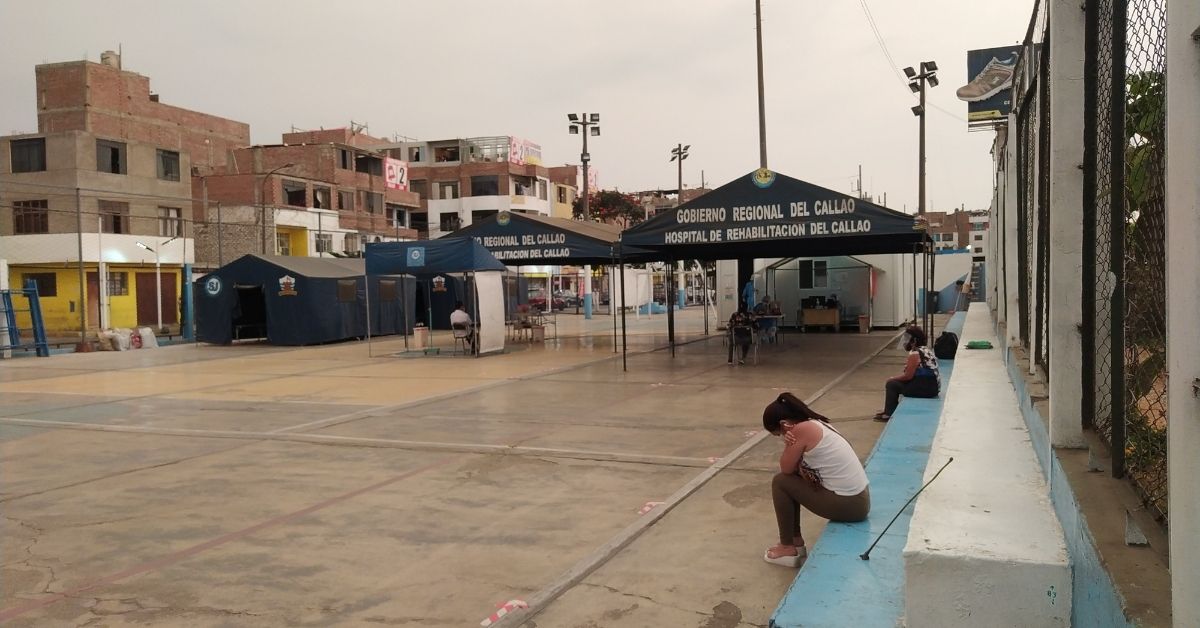
The San José del Callao Hospital on January 20, 2021 Callao, Peru. Regular infrastructure reached its limit at the beginning of the second wave of the disease in Peru. (Johnattan Rupire)
by Nancy Brouillard McKenzie
"Sooner or later, we will all encounter a person who is suffering. Each day we have to decide whether to be Good Samaritans or indifferent bystanders" (Fratelli tutti (FT) 69).
In Chile and Peru, the Covid-19 pandemic is surging and creating even more suffering for the poor and the vulnerable. The effects of the pandemic go far beyond being solely a health issue. Indeed, this is no surprise as Pope Francis persistently invites us to see that "everything is interconnected" (LS 138).
Now, as the pandemic controls our lives and the economy, Pope Francis asks us "to recover our concern for human beings, for everyone, rather than for the benefit of a few" (FT 33).
In the chapel communities in St. Columban's Parish in Chile, Fr. Daniel Harding SSC sees the harsh effects of Covid-19. He notes the widespread loss of jobs, shelter and food. Not surprisingly, each loss humiliates, frustrates and, in some instances, weighs on the mental health of individuals and families. The increase in domestic violence in the parish's migrant communities is an urgent issue.
Casa Betania is the temporary Migrant House for abused and battered migrant women and children fleeing their abusive partners. Before Casa Betania, the parish's only Migrant House was solely for single migrant men and it was full. It turned away requests to receive migrant women and children who were victims of domestic violence but who had no place to go.
Through a new encounter, the parish became Good Samaritans to migrant victims of domestic abuse. It received and helped a battered Haitian woman and her infant daughter find a permanent situation (FT 69).
With borrowed items, two parish meeting rooms became two livable bedrooms for migrant women and children to heal. Working with the Catholic Institute of Migration, Casa Betania's residents began receiving multiple services and developing more permanent situations for themselves. A ministry group of Fr. Martin Koroiciri SSC and dedicated lay leaders support Casa Betania and receive women referred from local hospitals or other networks.
As domestic violence against migrant victims increases, the success of Casa Betania may be short-lived. Fr. Dan needs donations to repair and improve the building, return borrowed items, refurbish rooms with new items, and add a meeting room for the two lost ones. Higher expenses for utilities and food are also a need. Without Casa Betania, how will the migrant victims of domestic abuse live?
In a similar act of caring for the poor in Peru, Fr. Ed O'Connell SSC with others launched Warmi Huasi in 2003. Warmi Huasi is a non-governmental organization working with communities to help families in poverty and children at risk. For the working mothers of San Benito, a Warm Huasi team and the community created safe places for their children and adolescents to receive many educational opportunities in the afternoons including Saturday.
Fr. Ed reported on the suffering of the poor in San Benito from unemployment, no income, food insecurity, and lack of reliable Covid-19 information. When the State gave money to the poorest families, people in San Benito were left out. Columbans stepped in to help.
Later, Fr. Ed explained that San Benito was facing "mass unemployment" and that the mothers there had not returned work. Despite no work and no income, mothers of different Warmi Huasi homework clubs in solidarity with their neighbors, stepped forward to share their resources and successfully set up three communal kitchens to feed their families at lower costs. Fr. Ed asked for "those who might be in a position to be in solidarity" with the San Benito mothers to donate to "help the families have a more nutritive plate of food each day."
Recently in the Independent Catholic News, Fr. Ed reported that the San Benito mothers are running five communal kitchens with the help of Columbans. As of April 1, 2021, those communal kitchens have a grand total of 999 meals daily. In Misiones, Columbans are working on another communal kitchen serving local families in need, including migrant families. The spirit of the Good Samaritan has also spread to the Columban parish of Archangels where parishioners wish to set up a lunch program for Venezuelan migrant families.
Nancy Brouillard McKenzie is a volunteer for the Columban Center for Advocacy and Outreach.
Copyright © 2025 Columban Center for Advocacy and Outreach, Washington, D.C.